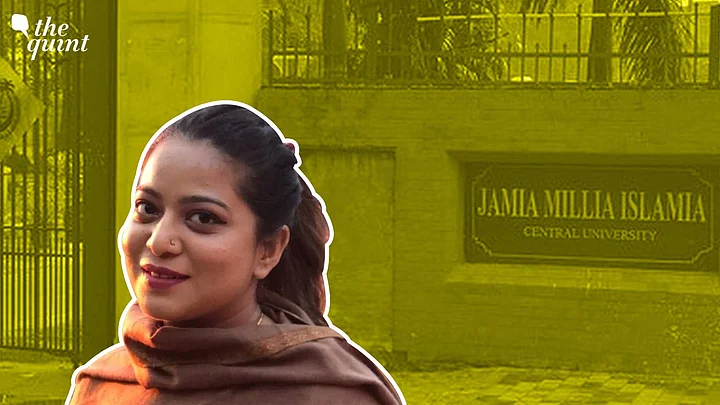In denying Safoora Zargar admission to complete her MPhil, it was initially thought that it might be a case where she might not have done her work as a scholar and was hence found insufficient by Delhi's Jamia Milia Islamia.
But after the two notices by the University where they banned Zargar and other students from the campus, Jamia Millia Islamia has come clean that the decision was political and had nothing to do with what she did as a research scholar.
This is the university administration admitting to the fact that it took action against Zargar only based on politics. The order regarding her campus ban says that she has been involved in organising agitations, protests, and marches on campus against ‘irrelevant and objectionable’ issues.
Universities have always been places where students can come up with fresh opinions, arguments, discussion, and disagreements.
And that is because it is an intellectual space. The moment that an academic starts agreeing with everything, there is no possibility of academic progress. It is only in schools, where there is strict control over what you wear and how you behave.
But as opposed to that, universities in India -- since Jawaharlal Nehru came up with the concept of the University Grants Commission (UGC) -- have been independent institutions that were given liberty. These institutions have always given full liberty to the intellect of students and teachers.
Attempts to Control Universities
Unfortunately, over the years, attempts have been made not only to control students, but also to control teachers -- what they should teach, what they should not teach, which books to prescribe and what should be banned. This has become the new character of universities and that is what the government of India, through its New Education Policy (NEP) is trying to accomplish: you teach only what the government of the day wants and you speak only what they want you to say.
Zargar’s case is a good example to demonstrate what is going to happen in the times to come. This trend is accelerating at a frightening speed and taking over campuses; whether they are state universities or central universities, where such restrictions are being implemented.
Freedom is being taken away deliberately from intellectuals. If you look at how our national movement against the Britishers was fought, you will find that it was fought on the campuses, by involving students, and the teachers. This was the case with the famous Non-Cooperation Movement, which our politicians keep on invoking.
Who were those who joined in boycotting the non-Indian products and promoting Khadi? They were students and teachers, in large numbers, among other members of the society.
My father was a master of Arabic and Persian at Ewing Christian College, Prayagraj. He took part in the Swadeshi Movement, but he was not thrown out of his job by the English principal. He used to wear Khadi when he would go teach his students. This present lot of politicians and the so-called administrators of various universities have to be reminded of all this.
Back then, even when we were under foreign yoke, ruled by non-Indians, freedom of expression was allowed. This has been given to us by our Constitution framed by Dr BR Ambedkar: we have the right to hold our views, to protest, and even ask for change. The only condition is that it should be through peaceful means.
History of Jamia Embedded in Protests
Jamia has a history embedded in protest and nationalism itself. Once upon a time, it was a part of the Aligarh Muslim University and at a time when it was felt that the nationalistic aspirations of the students of Aligarh were trying to be killed or contained, it was then that the founders of Jamia thought of starting a different university where they can express their views and ideas. And I think the present Vice-Chancellor of Jamia should read what those founders stood for.
The name ‘Jamia Millia Islamia’ itself can be translated to the ‘national university of Muslims’. The very idea of Jamia was that one can express their opinions. That was the spirit, which should be followed.
A Trend All Over?
Just before the COVID-19 pandemic, protests against the Citizenship Amendment Act (CAA) began. They were not confined to Jamia, and several campuses across India -- in north and south -- started protesting to safeguard the Constitution. At the end of the day, it was the students who were blamed. In recent years, we have seen this trend only grow stronger.
Recently, even at AMU, petitioners claimed that they were protesting peacefully during the anti-CAA movement and that there was police action taken against them.
The court dismissed the petitions, observing that students go to educational institutes to study and not indulge in activities that 'bring a bad name' to the institutes. So, they are essentially saying that students are expected to come to classrooms, read what they are taught and go back, completely forgetting that students should have their own opinion.
Professor Ali Nadeem Rezavi is a professor at the Department of History, Aligarh Muslim University (AMU).
